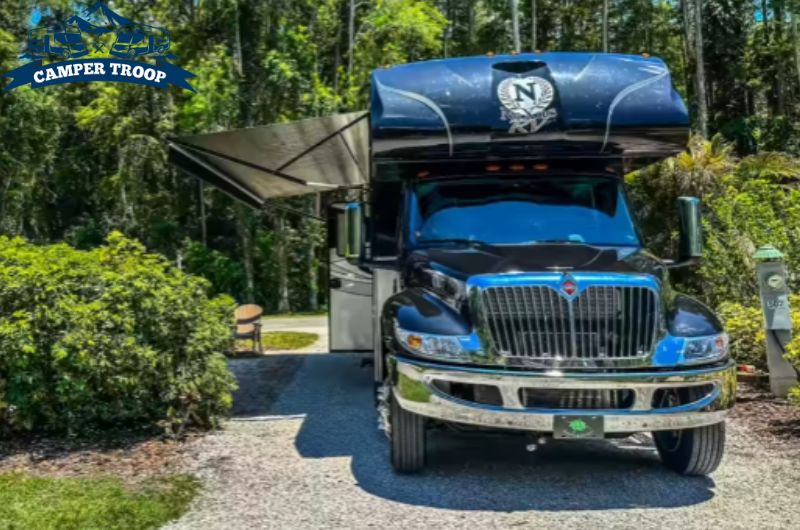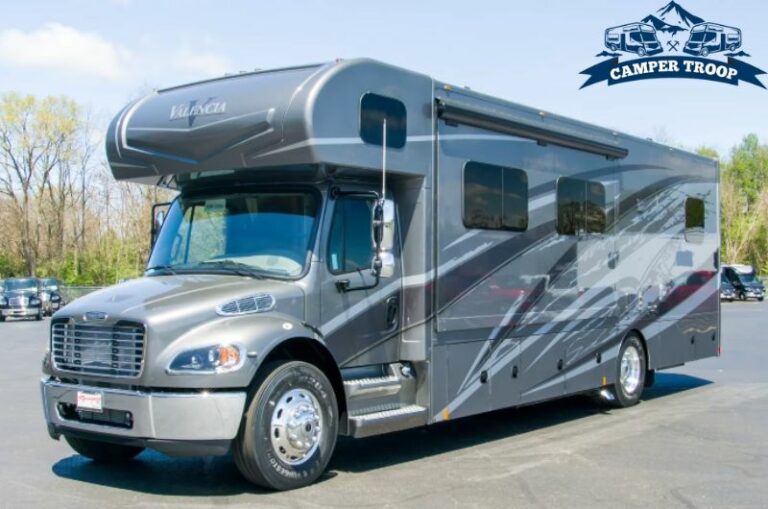6 Most Common Problems with Nexus RV (Troubleshooting Tips)
Nexus RV offers various motorhome classes with distinct technologies. But a standout feature for many is their 3-burner cooking stoves.
Despite this, common problems arise, including loose water connections and plumbing issues due to loose screws and water leakage. Faulty mounting bushings and racks affect the power steering, and incorrect battery wiring hinders electrical appliances.
Nonetheless, customers appreciate the flexibility to customize the interior design, allowing cabinet structures and flooring systems to be changed according to their preferences.

Nexus RV Problems, Causes & Solutions
Find the most common problems related to Nexus RV. Read them carefully and find the solutions.
1. Loose Water Connection
Water connection is essential for several activities, from everyday tasks in the kitchen to the use of washrooms. The relationship between water and the installation of pipes also holds significant importance.
Poorly fitted pipes can lead to numerous problems. Furthermore, using low-quality pipes can result in maintenance issues.
Water leakage from the water tank is caused by the substandard quality of plastics used in its construction. Additionally, the damage to the tank results from exposure to high temperatures.
The water tank in Nexus RV is situated in an area where it directly receives heat. As a result, it becomes more susceptible to damage.
Overheating arises because the water tank’s outer side is exposed to direct sunlight. Consequently, the interior walls are affected, leading to damage to the paint coating.
Peeling paints on the interior surface makes the interior look dirty. Such a thing contributes to the overall untidiness. Moreover, there are water leaks from the pipes caused by loose joints.
Joints are crucial in establishing connections throughout the motorhome, linking one pipe to another.
When the screws holding these joints together are loose, water can seep through them. The kitchen experiences leak due to the elevated temperature, weakening the pipes’ strength.
To avoid such problems, it’s essential to use high-quality plastic pipes that have a longer lifespan. Additionally, regularly tightening the screws at the joining points can help prevent these issues from arising.
Read Also: Common Problems with Entegra RV | Consider Before Buying
2. Battery Issue
Battery issues can significantly impact a vehicle’s functionality. They are crucial in powering the ignition and providing electricity to the entire RV.
Overheating can lead to electrical and wiring system failures in the battery. When wire connections become loose, the battery’s ability to supply electricity to the motorhome is compromised. Thus, electrical appliances fail to operate.
Furthermore, weakened batteries can cause sudden shutdowns of fans, air conditioners, and electrical heaters.
Maintaining the water fluid level in the battery is crucial. It ensures efficient functioning. Low water levels can lead to increased engine power consumption and overheating.
The issue with batteries often arises from the prolonged accumulation of corrosion on their terminals. Corrosion indirectly hampers the current flow, leading people to believe that their electrical appliances are faulty.
Corrosion forms on the terminals when regular maintenance is neglected. It is advisable to clean the terminals every six months using warm water. If you encounter any electrical appliances not functioning correctly, check the battery wiring.
To prevent overheating and melting, it’s also recommended to use good insulator tape around the wires. This will ensure the safe and efficient operation of the electrical system.
Read Also: 15 Common Problems with Crossroads RV (Practical Solutions)
3. Problem in Steering
Users of Nexus RV have raised complaints about various steering issues. One common problem is the steering pulling to one side.
This issue is typically caused by poor vehicle alignment and loose steering racks. Furthermore, any fluid leakage from the pumps or tubes can exacerbate the problem.
When fluid leakage occurs, the steering rack’s performance is compromised. It results in difficulty in steering movement.
Worn-out steering racks can also contribute to the problem. It increases friction and requires more force to steer the motorhome in different directions. In some cases, these worn-out racks produce noticeable vibration and clunking sounds.
These steering issues become more pronounced at high speeds, particularly if the steering racks are damaged. Proper maintenance and timely repair are crucial to ensure a smooth and safe driving experience with the Nexus RV.
Numerous individuals have expressed concerns about their power steering becoming heavy after extended drives. It is often caused by worn-out belts.
Mount bushings are installed to absorb the energy from bumps. However, if they loosen or tear, you may notice popping sounds and experience more jolts.
Prioritize regular maintenance and proper inspections to address these issues. While driving or embarking on a long trip, checking for hydraulic and steering fluid leakage is advisable.
Furthermore, inspecting the mounting bushings and racks for any damage or looseness is essential. These precautionary steps will help maintain a well-functioning power steering system and ensure a smoother driving experience.
Read Also: 9 Common Problems with Alpha Wolf RV (Troubleshooting Tips)
4. Swaying Issue
Numerous Nexus RV users have reported experiencing swaying issues when passing other motorhomes, particularly in crosswinds.
This problem is often attributed to the trailer’s considerable length, which lacks aerodynamic properties on its sides.
Furthermore, uneven weight distribution, such as having more weight on one side, can contribute to the swaying problem. Overloading the RV can result in bouncing. It also disrupts the focal point and gravity, further exacerbating the issue.
Moreover, driving at high speeds can cause the RV to bend on one side due to reduced stability. Therefore, increasing the risk of accidents.
Address weight distribution and avoid overloading the RV to enhance stability and reduce swaying. Additionally, driving at safe speeds in adverse conditions can significantly improve overall safety and driving experience.
Engaging in sudden and abrupt turns at high speeds can also contribute to this issue. Excessive weight at the rear of the trailer, coupled with sudden braking, increases the risk of bouncing.
Additionally, wheels that are worn out due to road hazards or improper air inflation can make the motorhome bouncy.
Driving on uneven and bumpy roads can negatively impact shock absorbers and struts. Such driving habits indirectly lead to swaying problems.
The vehicle can also bounce when damaged brake rotors come into contact with the brake pads.
Some individuals may experience bounciness while changing gears due to poor and faulty transmission systems.
To address this problem and prevent road accidents, it’s essential not to overload the trailer at the back. Also, maintain proper vehicle maintenance and care.
Read Also: 7 Most Common Problems with Chinook RV (Solutions Included)
5. Less Comfortable Seats
Comfortable seats are crucial for any vehicle. Travelers often seek a pleasant experience during long journeys.
In the contemporary era, power-adjustable seats have become increasingly popular. It allows you to position yourself in the most suitable direction for a clear view of the mirrors.
However, this particular motorhome needs a sufficient range of angles for adjusting the seats. This way, it hinders obtaining a clear view from the front mirror.
Driving over road hurdles can cause damage to the axle system, potentially leading to bending. Another issue with the seats involves scraping their vinyl sheet, both from the front and backside.
The use of poor-quality vinyl covers is a common reason for the scraping. Additionally, as the age of the cover, they tend to lose their strength, leading to tearing.
Exposure to heat from the engine compartment can also contribute to scraping. Damage of these vinyl sheets occurs when directly exposed to sunlight.
The tearing and scraping of the covers affect their appearance. It gives an unsightly look to the interior.
Furthermore, poor plumbing in this RV leads to water dripping and increased humidity levels. These conditions can accelerate the scraping off of the seat coatings.
In some cases, people also place harsh materials on the seats. Thus, they experience scratches on their surfaces. Proper care and using suitable materials can help prevent these issues and maintain the condition of the seats.
To maintain the vinyl covers in good condition, apply baby oils or moisturizers to keep them adequately hydrated. This helps prevent the formation of cracks on both the outer and inner sides caused by moisture loss.
Regularly applying oil or moisturizer to the surface of the covers can tackle this problem and ensure their longevity. Additionally, avoiding placing heavy objects on the seats is essential to prevent scratches and preserve their appearance. With proper care, the vinyl covers will remain in good shape and enhance the overall aesthetics of the vehicle’s interior.
Read Also: 6 Common Coach House RV Problems (Causes & Fixes)
6. Electrical Problems
Are you facing electrical problems in your Nexus RV?
Try removing the switches from the troublesome outlets and installing them in new sockets to check if they work correctly. If your Nexus RV uses fuses in its sockets, you can easily fix the connection by replacing them.
Fuses act as a safety feature, cutting off the connection if the current exceeds or falls below a certain threshold.
Once they have burnt out, purchasing and installing new fuses is the only solution. However, if your RV’s outlets don’t use fuses, you must replace the entire outlet.
You can easily find replacement outlets at nearby stores. Ensure they have similar installation screws as your previous sockets to avoid compatibility issues. To test the connection in your RV, you can use a voltmeter.
This simple process involves connecting the voltmeter to the socket and taking readings to confirm if the values are correct. This will help you determine if your outlets have malfunctioned or have other underlying issues.
FAQs.
What can cause damage to the axle system in Nexus RVs?
Damage to the axle system in Nexus RVs can be caused by the below reasons
- Hitting road hurdles
- Overloading the rear of the trailer
- Sudden braking with excess weight
- Driving on uneven or bumpy roads.
Why do Nexus RVs experience interior leaks, and how can I fix them?
Nexus RVs may experience interior leaks due to poor plumbing, worn-out seals, or damaged roof seals.
To fix them, inspect and repair any damaged seals, ensure proper plumbing connections, and reseal areas prone to leakage. Regular maintenance and prompt repairs can prevent and address interior leaks effectively.
Final Words
While Nexus RVs offer attractive features and customization options, there are common problems that owners should be aware of.
Loose water connections, plumbing issues, power steering concerns, and incorrect battery wiring can all impact the RV’s performance.
To avoid these Nexus RV problems, regular maintenance, timely inspections, and addressing issues promptly are crucial. Proper care and attention can significantly prolong the lifespan of Nexus RVs. With diligent upkeep and responsible usage,
Nexus RVs can provide enjoyable experiences and reliability for many years. This allows owners to make the most of their investments and cherish their adventures on the road.
Read Also: 5 Common Avenger RV Problems – Troubleshooting Guide

Zayan is an accomplished author and a go-to expert for all things RV and camper-related. With a passion for adventure and a knack for problem-solving, he has spent years exploring the open road and fine-tuning his knowledge of recreational vehicles.
Zayan’s writing is a testament to his expertise, offering readers practical solutions to common RV dilemmas. Whether it’s troubleshooting mechanical issues, optimizing space, or planning the perfect road trip, Zayan’s insightful advice and engaging storytelling make him an invaluable resource for both seasoned travelers and newcomers to the world of RVing.

![4 Common Problems with Winnebago Fuse [Solutions Included]](https://campertroop.com/wp-content/uploads/2022/01/Winnebago-Fuse-Problems-768x509.jpg)
![5 Common Problems with Roadtrek Zion [Solutions Included]](https://campertroop.com/wp-content/uploads/2022/01/Roadtrek-Zion-Problems-768x509.jpg)
![5 Common Winnebago Solis Problems [Solutions Included]](https://campertroop.com/wp-content/uploads/2021/11/Winnebago-Solis-Problems-768x509.jpg)
![4 Common Problems with Coachmen Prism [Solutions Included]](https://campertroop.com/wp-content/uploads/2022/01/Coachmen-Prism-Problems-768x509.jpg)

![Most Common Winnebago Paseo Problems [Solutions Inculded]](https://campertroop.com/wp-content/uploads/2022/01/Winnebago-Paseo-Problems-768x509.jpg)